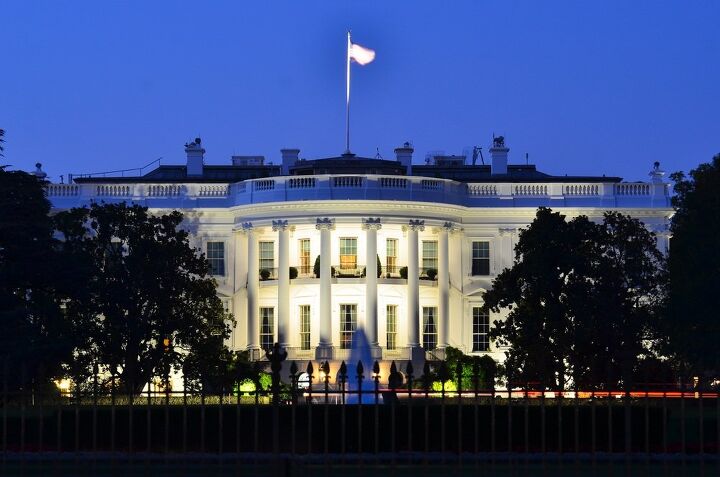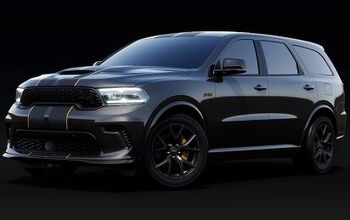White House Briefly Mentions Fixing Our Horrible Roads

On Thursday, President Joe Biden spent part of his day listening to a group of lawmakers discuss how much the United States might need to spend on fixing its horrible infrastructure. It’s an issue America has neglected through multiple administrations and has frequently been set back by partisan conflict.
Considering the White House is ruminating on how to source trillions of dollars in new infrastructure spending after the U.S. just printed $9 trillion (almost 25 percent all USD currently in circulation) for COVID relief, that’s unlikely to change. Everyone is worried about raising taxes and causing inflation during a period of economic uncertainty, or skeptical that the government will use the new funding responsibly. But our roads (among other infrastructure projects) are reaching a point where they can no longer be ignored, placing the entire country in a particularly sour pickle.
During the previous administration, Donald Trump had made it clear that restoring the national infrastructure, including roads, would be an essential issue. But no major infrastructure bills were passed during his presidency, as both parties argued where the funds could best be put to use or simply claimed projects would be too expensive. Most of Trump’s gains were made in the energy sector, with the biggest victory being the United States leveraging oil reserves to become energy independent. Framed as a national security issue, this ended up being the primary focus for much of his term. But President Trump signed an executive order providing federal agencies with the ability to fast-track infrastructure projects, specifically programs relating to highway/road construction and energy concerns, in June of 2020.
Joe Biden undid that executive order with one of his own his first day in office, noting that rigorous regulatory policies should remain in place to protect the environment. The reversal was just one of many that affected existing infrastructure policies. Biden also used EOs to cancel the then-in-progress Keystone XL pipeline while undoing more than 100 other actions taken by Trump in relation to various infrastructure projects using similar reasoning.
We’re back to square one it seems.
But the new administration claims it’s time to make some moves and held a bipartisan meeting in the Oval Office on Thursday aimed at addressing the issue. Meeting attendees included President Biden, Vice President Kamala Harris, Transportation Secretary Pete Buttigieg, and a slew of House representatives. Oddly, the official release didn’t name everyone. But Reuters identified Transportation and Infrastructure Committee Chairman Peter DeFazio (Democrat) and congressman Sam Graves (Republican) after having an opportunity to interview them following the hour-long meeting.
From Reuters:
Biden said at the beginning of the meeting that he aimed for the United States to “once again lead the world across the board in infrastructure” and said doing so “makes us a hell of a lot more competitive around the world.” The White House has declined to say how much Biden will seek to spend on infrastructure or how he would pay for it.
Graves said the infrastructure plan must be bipartisan and that a funding mechanism was needed.
“It cannot be a ‘my way or the highway’ approach like last Congress,” Graves said, referring to previous Democratic legislation. “A highway bill cannot grow into a multi-trillion dollar catch-all bill, or it will lose Republican support.”
A lot of this hinges on Congress. As previously mentioned, Trump also attempted to address issues like roadways and airports but was repeatedly blocked by lawmakers on passing a comprehensive bill dealing with either.
Biden actually went into office wanting more. He’s already vowed to invest $2 trillion into repairing and updating highways, bridges, airports, networking cities, establishing an electric vehicle charging network, and retrofitting old buildings to be greener. He’s also claimed he wanted to transition the entire country toward electric vehicles, starting with federal fleets while subsidizing the companies who build them.
Remarks released by the White House did little to explain how this would be paid for and which programs would be given priority, however. Questions were limited to just a couple of minutes and barely scratched the surface before ending abruptly. The only real information gleaned is that the future of what’s undoubtedly the most heavily used passenger rail line in the entire country — the Northeast Corridor, which links Newark, New Jersey, and New York City — remains uncertain. Reporters spent the rest of their brief time asking about COVID relief.
Here’s the full transcript from the White House:
THE PRESIDENT: Hey, everybody. I brought a group of bipartisan leaders on infrastructure, among other things.
We’re going to talk about infrastructure and American competitiveness and what we’re going to do to make sure we once again lead the world across the board in infrastructure. It’s a — it not only creates jobs, but it makes us a hell of a lot more competitive around the world if we have the best infrastructure in the world. We’re going to be talking about that.
And I welcome all my colleagues here. And thank you all for coming on in. Thank you.
Q: Mr. President, Republicans have been trying to slow down the coronavirus bill. Republicans have been trying to slow down the coronavirus bill. Have you been reaching out to them to try to bring them along?
THE PRESIDENT: I’ve been talking to a lot of my Republican friends in the House and the Senate, and continue to do that. And — and we have. We’ve met — had a number of meetings with Republicans on the coronavirus bill and — House, Senate, and a combination of both. So we’re keeping everybody informed.
Q: Are you comfortable with having to limit the direct payments? Are you comfortable with having to limit the direct payments?
THE PRESIDENT: Am I comfort- —
Q: Comfortable with having to limit the direct payments?
THE PRESIDENT: Yes. Thank you.
Q: Does the proposal include the Gateway Project, Mr. President?
THE PRESIDENT: I’m sorry. Can’t hear him. Thank you all for coming in. Thank you.
[Image: Orhan Cam/Shutterstock]

A staunch consumer advocate tracking industry trends and regulation. Before joining TTAC, Matt spent a decade working for marketing and research firms based in NYC. Clients included several of the world’s largest automakers, global tire brands, and aftermarket part suppliers. Dissatisfied with the corporate world and resentful of having to wear suits everyday, he pivoted to writing about cars. Since then, that man has become an ardent supporter of the right-to-repair movement, been interviewed on the auto industry by national radio broadcasts, driven more rental cars than anyone ever should, participated in amateur rallying events, and received the requisite minimum training as sanctioned by the SCCA. Handy with a wrench, Matt grew up surrounded by Detroit auto workers and managed to get a pizza delivery job before he was legally eligible. He later found himself driving box trucks through Manhattan, guaranteeing future sympathy for actual truckers. He continues to conduct research pertaining to the automotive sector as an independent contractor and has since moved back to his native Michigan, closer to where the cars are born. A contrarian, Matt claims to prefer understeer — stating that front and all-wheel drive vehicles cater best to his driving style.
More by Matt Posky
Latest Car Reviews
Read moreLatest Product Reviews
Read moreRecent Comments
- Add Lightness I don't waste a lot of time watching nothing much happening by watching the YouTube 6 minute highlights.
- MrIcky from my rental fleet experience, id rather drive one of these than a camry.
- Add Lightness Protectionist fear competition under the guise of paranoia.
- Kjhkjlhkjhkljh kljhjkhjklhkjh But facebook, instagram, twitter, your cell phone, your chevy/ford/dodge, your debit card, your credit card selling your data to the SAME OVERSEAS DATABROKERS is ok.Meanwhile parler, telegram literally run on russian hardware is also ''ok''
- Redapple2 Dear lord ! That face. HARD NO.


































Comments
Join the conversation
Gee Matt, sorry your orange candidate lost. But I hear Faux News is hiring. I think your "talents" for selective quotation would be truly prized there.
What bad roads? The roads here in Georgia (and most states around us) are actually pretty good. Exceptions to this rule are usually roads maintained by local government, such as Atlanta. Generally though roads are great. We feel like this especially after visiting relatives in Michigan :-p How a state whose livelihood is largely dependent on the manufacture of automobiles can at the same time have such a shoddy infrastructure for automobiles is a mystery to us.